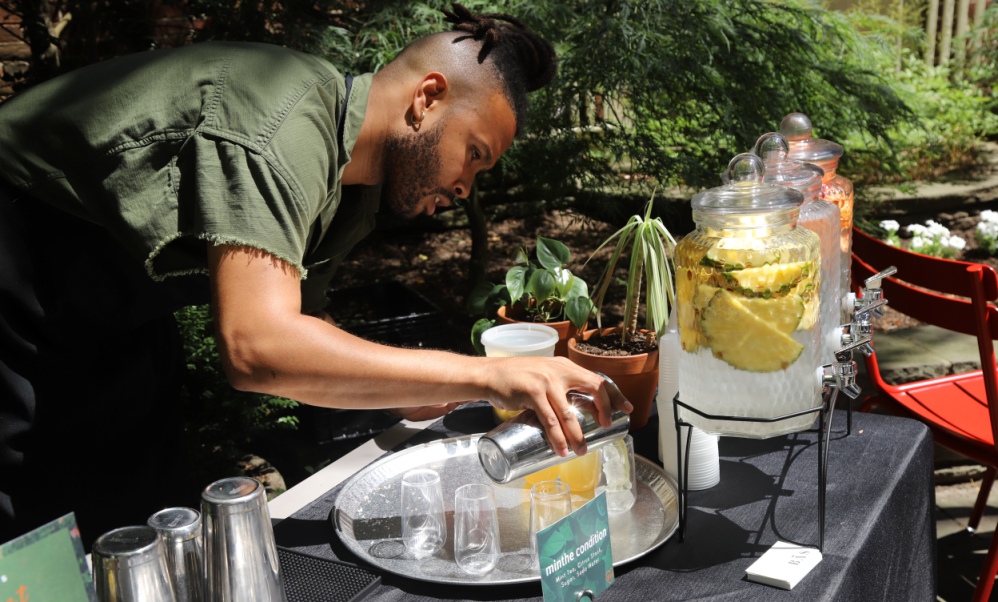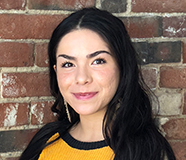Two years ago Michael Silva started BĀS, a specialty cocktail service based out of Providence. As a teacher by day Michael pays attention to how spaces make people feel. After experiencing the cocktail culture in both Providence and New York, he wanted to create events that mixed love for others and a respect for the ingredients we choose to enjoy. Before the new year, we had the pleasure of talking with Michael, a 2018 Incubator Alum, at our SEG Hub.
Serena Manna: Tell us about yourself and how you started BĀS.
Michael Silva: I got submerged in the cocktail culture here in Providence when I started working at the Dorrance. It’s a really beautiful establishment and I owe everything to that place, but I struggled with being the only person that looked like me, walked like me, and talked like me, and that was both behind the bar and more importantly in front of the bar. I wanted to do this work while being in a room of people who looked like me. So I started practicing on my friends in my parents’ basement, where my dad had built a bar. It was perfect. We literally turned the basement into a cocktail bar. Think menus, different cocktail glasses, music, lighting, all types of things, the way the stools stood.
You think about who our influencers are growing up – my parents have always been very social, so my dad built a bar and here I am doing this whole bar thing.
SM: How do you describe BĀS to your friends and the community? What is your purpose?
MS: The purpose has always been to educate what I feel is an underrepresented demographic in the cocktail culture. I woke up one day and felt like there was a void – a lack of access, lack of information, and lack of flow in knowledge. What we want to do is bring all this cocktail culture knowledge and information to a demographic who might really like it and spend money on it.
“Those who are on the fence about doing something, just do it. Create the experience that you need, because no one is going to give it to you. But also be wise enough to understand it takes a village and a lot of hard work goes into it.”
What it’s really about is creating a space in the cocktail world here in Providence. Sometimes it is easier for me to say it diplomatically, but other times it really is as clear as black and white – I feel like we can introduce a group of people to different spaces they’ve never heard about or been to before, and introduce them to new things.
SM: As a popup venture, what’s it like to find these spaces in Rhode Island?
MS: It’s always been about establishing relationships. Building relationships with people who have these establishments, who have their bars, who have their liquor licenses for us to be able to function – and trusting me with what we’re doing. Finding all these spaces and having that knowledge of who’s out there and reaching out to people, and us reaching out to others. I think every collaboration we’ve done, people have reached out to us and that’s been really cool.
SM: About building relationships, how did you connect with SEG a year ago?
MS: Someone mentioned SEG to me when I was talking about BĀS. One of the things that I struggle with every single day is that I am in the dark about being an entrepreneur. I struggle with this because I didn’t go to school for this, no one is telling me what to do. At one point I reached a wall and thought “all right I need help,” and when I heard about SEG I thought “this is exactly what I need.”
“I wasn’t aware of all the little subcultures – in the restaurant industry, farming, and agriculture. It’s really close knit and there are people out there who want to help you.”
SM: What was the best piece of advice you received during your time in the SEG Incubator?
MS: Know your numbers. What that meant to me was remember why you’re doing what you’re doing. Find that balance where you’re being kind to everyone and doing honest work while making money and spending the proper amount of money you need to. It still is a business.
I got the most from the whole community aspect too. Like I said, I wasn’t privy to this knowledge and I felt like I was in the dark. I had no idea how massive the startup community is in Providence. I wasn’t aware of all the little subcultures – in the restaurant industry, farming, and agriculture. It’s really close knit and there are people out there who want to help you.
SM: Biggest challenges and biggest accomplishments?
MS: One of my biggest roadblocks was not having experience. I couldn’t really find a place to bartend, but now I am bartending my own thing. By managing BĀS I am creating the experience I need. I was able to create my own ecosystem, and again it starts with places like SEG and Hope & Main that have really empowered me. I just started at Hope & Main, and I feel confident there because it reminds me a lot of the program I did with SEG. I’m comfortable and ready to talk about things and be more active.
SM: Tell us about the Hope & Main opportunity!
MS: I knew I needed to get my licensing ready, and the biggest thing that they have for me is access to a commercial kitchen. The resources they have are a cherry on top. What they did for us was streamline the process of going through the health inspector to get our licensing.
SM: For 2020, what are your impact goals?
MS: Once I get my catering license, I can get a Class P license which allows me to sell alcohol as long as food is provided, anywhere. We will be available for hire, and we will be able to hire people who are interested in the service industry and want to come in and do honest work. As much artistic freedom and liberation I’ve had doing BĀS, I need to be able to fund those things that I want to do. So why not fund it being a caterer and building relationships with people? We still want to do small events, like 50-person weddings. Those are a lot more intimate, and people really trust what we are doing. We would be making money and still establishing connections, and that will take us to the next level. Right off the bat we’re giving people jobs, we’re creating community, and we’re creating activity.
“I feel like the secret is out about us. We can still curate for our small audiences, but people know about us and we need to grow.”
SM: What’s your favorite drink to make?
MS: I like gin. At our last event we did an all-gin menu because a lot of people dislike gin and we wanted to show a different way to drink it. We’ve also been experimenting with mocktails, which is really cool because now everyone has access. You’re not limited because you don’t drink – we’ve got you covered, you can come and be social!
SM: Tell us more about that event.
MS: It was called the Botanical Project. We did a menu with five different drinks and five different types of gin. We called it the Botanical Project because you need botanicals to make gin, and treat it a certain way to get a glorious product. We worked with a new restaurant downtown named Berrí. The owner, Siobhan Chavarria, has been a vital part of our beginning. We used another space of hers for our very first official event and it was wonderful to work with her again. We created decorations with potted plants placed in unconventional objects to visually represent growing anywhere as long as you use proper ingredients, nourishment, and love.
With BĀS it’s a similar idea, we’re in all these unconventional spaces, anywhere that will have us really, and we’re able to celebrate putting together events for two years. That is what we wanted to represent with the Botanical Project – grow where you’re planted. Things may not always be what you want them to be, but if you work hard enough you can get it done. There were a bunch of layers to what we were doing and why we were doing it. We’re expressing ourselves and how we feel. The Botanical Project to me was huge. It was in downtown Providence, and we were right in front of the Providence Performing Arts Center! Look at what we’ve been able to do by creating all this space and growth. I was really proud of us.
SM: What’s it like to balance growth and also keep BĀS a secret?
MS: We still want to keep an elusive feel, but now we have an audience. In November we were on Jen’s Dish Radio, which covers all things local food and beverage. (Listen here.) I feel like the secret is out about us. We can still curate for our small audiences, but people know about us and we need to grow. We put our audience in three new spaces this year that I know they never would have gone to otherwise. So that’s how we maintain the secret – we’re going to put you in spaces you’ve never been in.
We did an event with Narragansett Beer at Riffraff, and I know my audience had never been there. It’s a little off the beaten path, and that’s almost like its biggest appeal. People brought their dogs, their kids – there were three, four generations of people, and that’s great because we want to create a space where everybody can come. We also did this place called Lonely Street, a little bar you could walk past a million times and you would never even know there’s a bar there.
We’re lucky to have this audience and now that we have this platform we can bring people to more places like Berrí and Lonely Street. At every event we also like to give people something as a keepsake. We’ve done coasters, we’ve done hand fans, little match books, and we always do postcards so you can write to your friends who couldn’t make it.
SM: Any upcoming news and events?
MS: We want to maintain relationships with our audience when we’re not actively doing events, because we do events once every two and a half, three months. We’ve been working on a new product called MXR (pronounced “mixer”). Every month we are going to send you everything you need to create your own cocktails at home. We know we’re not the first ones to do this, we’re not inventing the wheel here, but again in terms of highlighting community, creating activity, and educating people that’s what we really want to do.
SM: What advice do you have for people who are thinking about starting a social venture?
MS: Those who are on the fence about doing something, just do it. Create the experience that you need, because no one is going to give it to you. But also be wise enough to understand it takes a village and a lot of hard work goes into it. It really is about maintaining those relationships and just going for it. Check your surroundings, see what kind of resources you have, and use them! If someone says no, someone else is going to say yes, so just do it!
Be sure to follow BĀS on Instagram @baspvd
By Serena Manna
SEG Communications Coordinator


